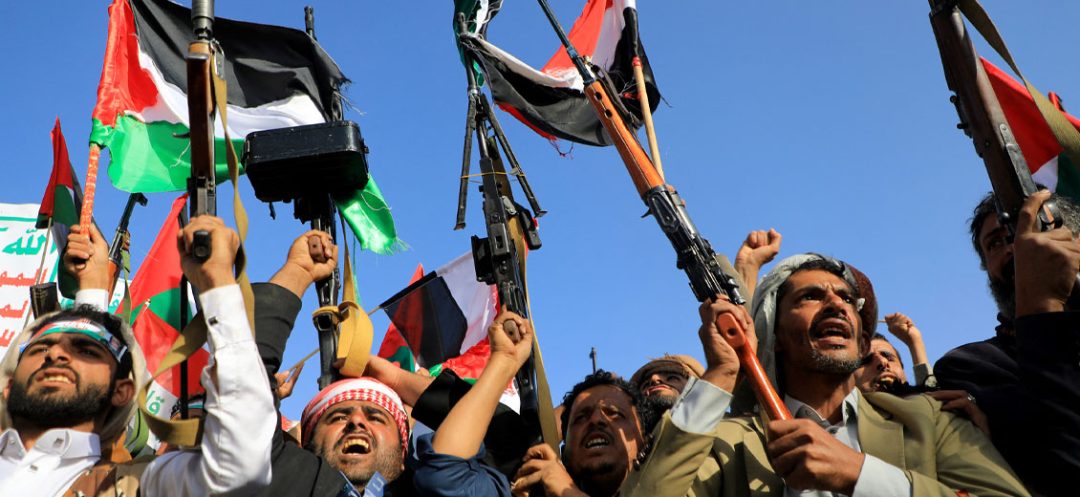Listen to the article
Saturday marks the ten-year anniversary of the Houthi capture of Sana’a, Yemen’s capital city. A decade of Houthi rule has transformed the country, putting an end to its tentative liberalization, and replacing it with an increasingly radical theocratic police state.
Ten years ago, on September 21, 2014, the Houthis declared the capture of Yemen’s capital, Sana’a.
Having descended from the hills of their remote mountain stronghold in the region of Saada, after a shocking six-month-long blitzkrieg campaign, they seized the capital, leaving 200 dead.
The very next day, the Houthis signed a ceasefire agreement designed to bring the esoteric Zaydi political movement into the government’s ranks, paving the way for the withdrawal of their forces and the continuation of the country’s ongoing democratic transition.
As this was happening, Houthi fighters stormed the Sana’a home of General Ali Mohsen al-Ahmar, one of their main rivals in the government – in what, with time, clearly appears to have been a haunting antecedent to the Houthis’ increasingly iron-fisted grip on the country.
A Lost Decade of Progress
Ten years on, Yemen has been transformed, its tentative democratic liberalization dying a cot-death at the hands of the Houthis, who have built an increasingly isolated theocratic police state in its stead.
In the heady days of the Arab Spring, the 33-year rule of President Saleh was brought to an end by the power of the Yemeni street, kickstarting a period of increasing openness and optimism across Yemen.
“We had a growing phenomenon of mixing men and women in coffee shops, in schools and universities. There were political parties, a kind of democracy, freedom of speech and freedom of the press,” says Maysaa Shuja Al Deen, a senior researcher at the Sana’a Center for Strategic Studies.
But since the Houthis took power, “the country lost a decade of progress, the genders are separated, the political situation is closed – there is no freedom of expression, no press freedom, most of the journalists have either fled or are in prison, there is no opposition or political parties.”
“They are trying to change society instead of themselves, because they know we won’t accept them,” says Shuja Al Deen.
Over the last decade, the Houthis have had an iron grip on Yemen’s politics.
The Supreme Revolutionary Committee, established by the Houthis in the months following their takeover of Sana’a as an interim governing body designed to incorporate previously opposing elements of Yemeni society into the political structure, has been largely sidelined.
Simultaneously, “the Houthis built a parallel system of governance by appointing loyalists to low-level administrative position, laying the groundwork for complete state capture, with non-Houthi affiliated individuals now largely excluded from state institutions,” Luca Nevola, a Yemen specialist at ACLED, told This is Beirut.
Anti-Western Radicalization
With power increasingly centralized in the hands of the movement, particularly within the Houthi family itself, they have become more confident at imposing their vision on Yemen.
“The Houthi ideology is built on two central pillars: anti-imperialist, anti-Western political rhetoric, and an esoteric Zaydi religious stance on social matters,” says Nevola.
The Houthis, alongside the rest of Iran’s “axis of resistance,” perceive themselves to be the frontline in the Ummah’s fight against the Western empire. A prophetic sense of religious vindication has facilitated “a Manichean black-and-white categorization of Yemeni society into allies versus enemies,” in order to excuse their repression and justify their increasingly dramatic strategies of indoctrination.
Education has been transformed under the Houthis. “They have imposed ‘culture’ courses on all students and civil servants, where they show them the lectures of Hussein Al-Houthi [the movement’s founder], and teach them the merits of Houthi ideology,” according to Shuja Al-Deen.
“They are also militarizing the next generation of society. They have added military courses into the school curriculum, where they train them on light weapons and military tactics. They now run ideological summer camps, to prepare the next generation of fighters.”
Alongside this is the increasing propagandization of society and an intensifying cult of personality around their leader, Abd Al-Malik Al-Houthi.
Outside media has been entirely suppressed, with the Houthis tightly controlling the information the population has access to. The streets are lined with propaganda, lionizing the leaders and martyrs of the group. The Sunni religious establishment has been forced to fall in line, with Imam’s speeches closely monitored for dissent.
Growing Zaydi Fundamentalism
The theological nature of the movement has also resulted in the imposition of an increasingly conservative Islamic dimension to Yemeni social life.
Whereas former President Saleh emphasized the concept of “Republican Yemen” and a national identity of southern Arabs, the Houthis now focus on “faith identity” as the foundation of national belonging, reports Nevola.
“They are building an Islamic state – there are no questions about it,” says Mohammed Al-Basha, a Yemen analyst at the US-based Navanti Group, “they are essentially becoming a Zaydi version of the Taliban.”
The Houthis’ religious bellicosity is increasingly apparent both in their discourse and actions.
According to Al-Basha, as the cult of personality around the leader intensifies, Abd Al-Malik Al-Houthi has been transformed in the discourse of the movement. He is no longer just the leader of the Houthis, but has been imbued with divine significance, as the Mahdi and the savior of the Ummah destined to destroy the satanic Judeo-American empire in the fields outside Al-Quds.
Luca Nevola’s organization, the ACLED, has recorded several instances of the imposition of Zaydi religious practices on the Sunni population.
Justified under Islamic jurisprudence, the freedoms of women, courageously fought for in the years after the Arab Spring, have been systematically rolled-back.
The sexes are increasingly segregated in schools, universities and public life. Dress codes, which had previously been relaxing, have become far more conservative, with more women donning the Niqab than ever before.
Women are restricted from moving between cities without a male guardian, and whilst many women still work due to the poor economic situation, the opportunities for social mobility are increasingly limited.
“Before the Houthis you had female government officials, members of parliament – even ministers,” says Al-Basha, “but that’s all gone now, the Houthis are systematically replacing women with men across the public sector.”
A Shattered Economy
Yemen’s economy is in crisis under the Houthis. Although Yemen has always been a poor country, an eight-year-long civil war with the internationally recognized government and a grinding economic blockade have transformed the country into the “world’s greatest humanitarian disaster,” according to the UN.
With characteristic paranoia, the Houthis have refused to use the currency issued by the internationally recognized government, resulting in a severe cash shortage.
Throughout the last decade, as generations have burnt through their savings, property and jewelry just trying to survive the war, the middle class has essentially disappeared. At the same time, “a new class of millionaires has emerged, all of them with links to the Houthis,” says Al-Basha.
The Houthis’ economic stranglehold is having severe humanitarian implications. Food importers simply don’t have the cash on hand to pay for imports, putting enormous pressure on the county’s food supply.
The Houthis have systematically targeted “foreign” actors, like the UN and international aid organizations.
In June, they detained 11 UN personnel, alongside three employees of a local human rights group, accusing them of being part of an American-Israeli spy network.
According to Al-Basha, they are seeking to control the “entire apparatus of the international aid response to Yemen, ensuring which Yemenis can be hired to ensure their loyalty and mandating the hiring of Houthi-aligned firms to direct aid-funds into their coffers.”
As a result, there is a wide exodus of international aid organizations from the country, with vital funds being redirected to crises in Sudan, Palestine and Gaza.
Yemen, a decade on from the Houthi takeover, finds itself fractured by civil war, with the hope of liberalization crushed under the boot of an increasingly extreme theocratic police state.
The war in Gaza has only strengthened the Houthis’ hand, so it seems like Yemen’s dark trajectory is only set to continue.





